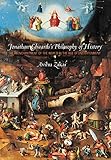Jonathan Edwards's Philosophy of History : The Reenchantment of the World in the Age of Enlightenment / Avihu Zakai.
Material type: TextPublisher: Princeton, NJ : Princeton University Press, [2009]Copyright date: ©2003Edition: Course BookDescription: 1 online resource (368 p.)Content type:
TextPublisher: Princeton, NJ : Princeton University Press, [2009]Copyright date: ©2003Edition: Course BookDescription: 1 online resource (368 p.)Content type: - 9780691144306
- 9781400825608
- RELIGION / Christianity / History
- Antichrist
- Apostasy
- Arianism
- Arminianism
- Calvinism
- Christ
- Christian Church
- Christian ethics
- Christian revival
- Christian theology
- Christian
- Christianity
- Christocentric
- Christology
- Church Fathers
- Constantine the Great and Christianity
- Consummation
- Contingency (philosophy)
- Conversion of the Jews
- Cotton Mather
- Deism
- Deity
- Disenchantment
- Divination
- Divine grace
- Divine providence
- Doctrine
- Dynamism (metaphysics)
- Early modern period
- Eschatology
- Ethics
- First Great Awakening
- George Whitefield
- God
- Good and evil
- Great Awakening
- Great chain of being
- H. Richard Niebuhr
- Herbert Butterfield
- Heresy
- Historical criticism
- Historiography
- Ideology
- Illustration
- Immanence
- Infidel
- John Calvin
- John Foxe
- Justification (theology)
- Major religious groups
- Manifestation of God
- Materialism
- Mechanical philosophy
- Methodism
- Millennialism
- Miracle
- Morality
- Natural philosophy
- Natural religion
- Natural theology
- Old Testament
- Omnipotence
- Omniscience
- Orthodoxy
- Pastor
- Perry Miller
- Philip Melanchthon
- Philosopher
- Philosophical theology
- Philosophy of history
- Philosophy
- Pietism
- Piety
- Plan of salvation (Latter Day Saints)
- Postmillennialism
- Potentiality and actuality
- Prophecy
- Protestantism
- Puritans
- Religion
- Religious conversion
- Religious experience
- Religious text
- Sacred history
- Salvation History
- Satan
- Second Coming
- Second Great Awakening
- Secularization
- Sermon
- Sinners in the Hands of an Angry God
- Socinianism
- Teleology
- The City of God (book)
- Theology of the Cross
- Theology
- Theory
- Universal history
- World
- Writing
- online - DeGruyter
| Item type | Current library | Call number | URL | Status | Notes | Barcode | |
|---|---|---|---|---|---|---|---|
 eBook
eBook
|
Biblioteca "Angelicum" Pont. Univ. S.Tommaso d'Aquino Nuvola online | online - DeGruyter (Browse shelf(Opens below)) | Online access | Not for loan (Accesso limitato) | Accesso per gli utenti autorizzati / Access for authorized users | (dgr)9781400825608 |
Frontmatter -- Contents -- Abbreviations -- Preface -- Introduction: The American Augustine -- Edwards’s Life of the Mind -- One. A Short Intellectual Biography -- The Soul -- Two. Young Man Edwards: Religious Conversion and Theologia Gloriae -- Space -- Three. Theology in the Age of Scientific Reasoning: Edwards and the Reenchantment of the World -- Time -- Four. The Ideological Origins of Edwards’s Philosophy of History -- Five. God’s Great Design in History: The Formation of Edwards’s Redemptive Mode of Historical Thought -- Six. Edwards’s Philosophy of History: The History of the Work of Redemption -- Seven. “Chariots of Salvation”: The Apocalypse and Eschatology of the Great Awakening -- Ethics -- Eight. Edwards and the Enlightenment Debate on Moral Philosophy -- Epilogue. Edwards and American Protestant Tradition -- Index
restricted access online access with authorization star
http://purl.org/coar/access_right/c_16ec
Avihu Zakai analyzes Jonathan Edwards's redemptive mode of historical thought in the context of the Enlightenment. As theologian and philosopher, Edwards has long been a towering figure in American intellectual history. Nevertheless, and despite Edwards's intense engagement with the nature of time and the meaning of history, there has been no serious attempt to explore his philosophy of history. Offering the first such exploration, Zakai considers Edwards's historical thought as a reaction, in part, to the varieties of Enlightenment historical narratives and their growing disregard for theistic considerations. Zakai analyzes the ideological origins of Edwards's insistence that the process of history depends solely on God's redemptive activity in time as manifested in a series of revivals throughout history, reading this doctrine as an answer to the threat posed to the Christian theological teleology of history by the early modern emergence of a secular conception of history and the modern legitimation of historical time. In response to the Enlightenment refashioning of secular, historical time and its growing emphasis on human agency, Edwards strove to re-establish God's preeminence within the order of time. Against the de-Christianization of history and removal of divine power from the historical process, he sought to re-enthrone God as the author and lord of history--and thus to re-enchant the historical world. Placing Edwards's historical thought in its broadest context, this book will be welcomed by those who study early modern history, American history, or religious culture and experience in America.
Mode of access: Internet via World Wide Web.
In English.
Description based on online resource; title from PDF title page (publisher's Web site, viewed 27. Jan 2023)


